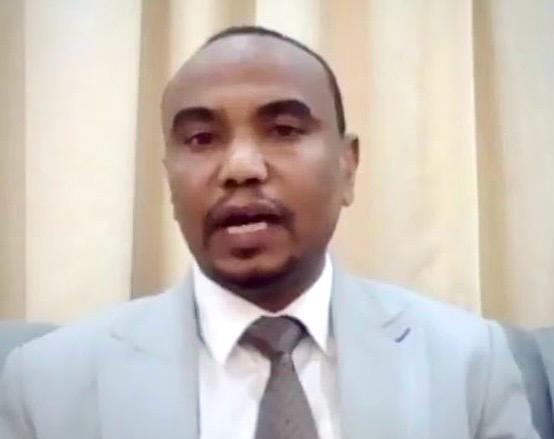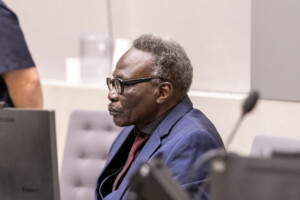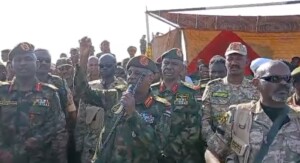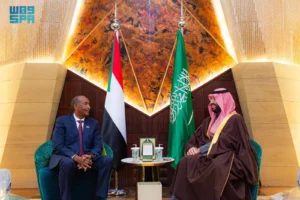RSF ‘will not withdraw from Sudan gov buildings before a political deal’, says advisor

Mohamed El Mokhtar, RSF advisor and member of the RSF negotiating delegation (Photo: RD)
In an interview with Radio Dabanga, Mohamed El Mokhtar, advisor to Rapid Support Forces (RSF) Commander Mohamed ‘Hemedti’ Dagalo and member of the RSF negotiating delegation, defended the paramilitary group’s stance at the recent Geneva talks held earlier this month.
El Mokhtar was interviewed by Radio Dabanga journalist Ashraf Abdelaziz at the heels of the Geneva talks, held between the Sudanese Armed Forces (SAF) and the RSF in the Swiss city between July 11-19. The indirect negotiations concluded without reaching an agreement concerning the safe passage of humanitarian aid in Sudan.
When El Mokhtar was asked about claims that the RSF is quick to respond to negotiation calls due to weakening battlefield positions and a loss of command over their forces, the RSF negotiator dismissed these assertions. “Our position on negotiations is principled, not tactical. We recognise that the war, ignited by the leaders of the former regime, has exacerbated civilian suffering and displacement, and destroyed infrastructure.
“Our operational position is strong, as evidenced by our recent control of new military sites. We are not negotiating from a position of weakness; our forces are advanced on all fronts.”
Addressing SAF allegations that the RSF refuses to implement the Jeddah Declaration, El Mokhtar retaliated that “the army’s leadership uses the Jeddah Declaration as an excuse to avoid negotiations, as their weak position lacks manoeuvrability.
“The Jeddah Declaration is a humanitarian agreement that both parties should commit to protect civilians. Claims that the RSF did not abide by it are unfounded.”
He detailed the RSF’s efforts to adhere to the Declaration: “We have established a joint committee with five representatives from the RSF, five from the SAF, and two international experts. This committee reviewed Khartoum and found no RSF presence in the hospitals. Instead, we have rented private hospitals for our wounded, as many hospitals were destroyed by the army’s air strikes.”
El Mokhtar also accused the SAF of obstructing humanitarian aid: “El Burhan has explicitly stated that humanitarian aid cannot reach RSF-controlled areas, a stance supported by his assistant, Yasir El Atta. This use of humanitarian aid as a weapon against civilians contradicts the principles of the Jeddah Declaration.”
SAF has previously shut down trade routes over concerns that they might be used to supply the RSF, leading to accusations that the Sudanese government was using starvation as a weapon.
Civilian areas
El Mokhtar also addressed accusations by the SAF that the RSF is occupying civilian areas. “We do not have any RSF personnel stationed in civilian homes. If people returned to their homes, the RSF would not prevent their entry”.
He added that the term ‘civilian areas’ is often misused by the SAF: “The term is used by the SAF to refer to high-profile government sites like the General Command and the Republican Palace, not service centres such as hospitals or utilities.
“We are present in military bases and public areas, not in private residences. The control we exert over regions like Wad Madani, Sennar, Darfur, and West Kordofan was achieved without occupying civilian homes.”
Discussing the motivation behind the SAF accusation, El Mokhtar said that “claims of the RSF occupying private residences are intended to stir emotional responses and do not reflect the reality of our operations. The RSF is deployed in strategic locations necessary for our operations, not in residential areas”.
The SAF’s insistence on RSF withdrawal from key government sites as a precondition for a ceasefire remains a significant sticking point. “El Burhan has told his generals that he cannot sign a ceasefire agreement while the RSF controls these sites”.
El Mokhtar said however that the RSF “would only consider such a withdrawal following a comprehensive political agreement addressing the root causes of the Sudanese crisis”, adding that “battles and air strikes are what led to the displacement. Without stopping military actions, people cannot return home.”











 and then
and then